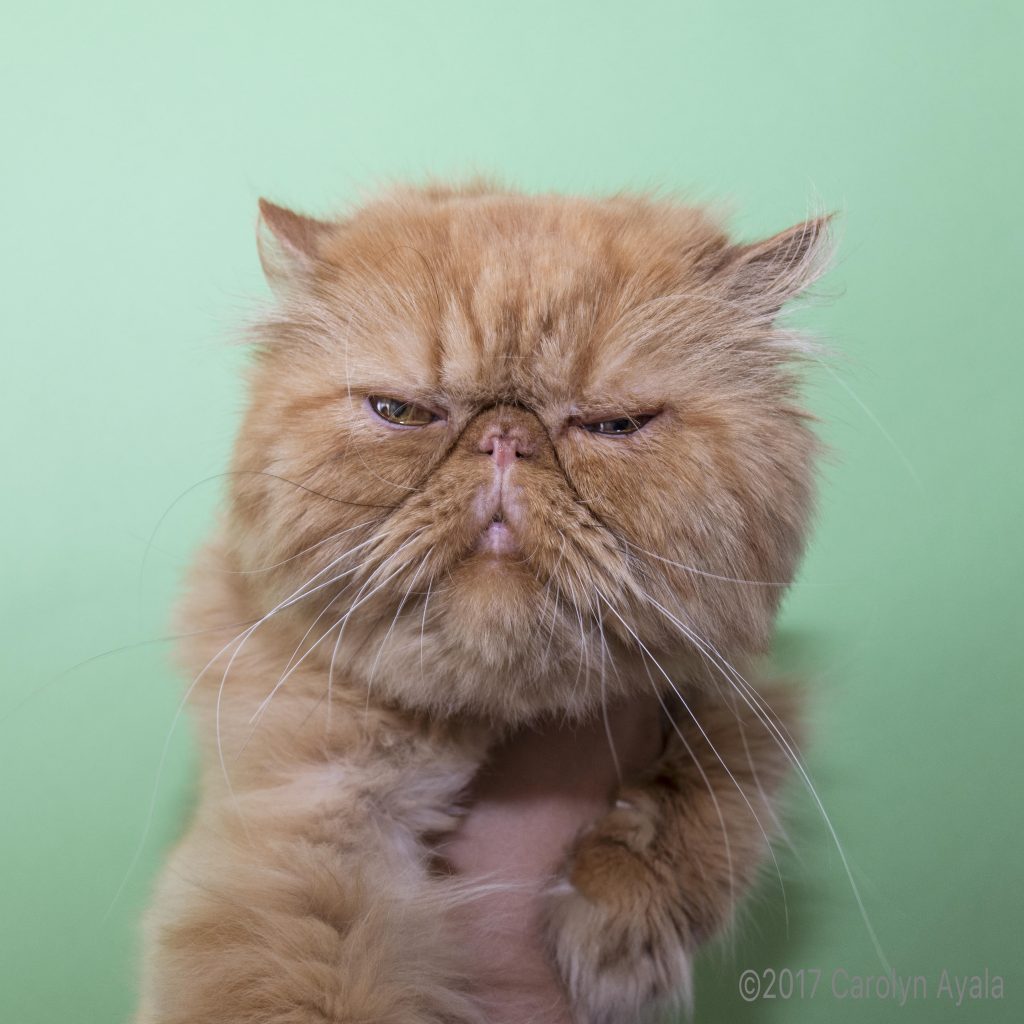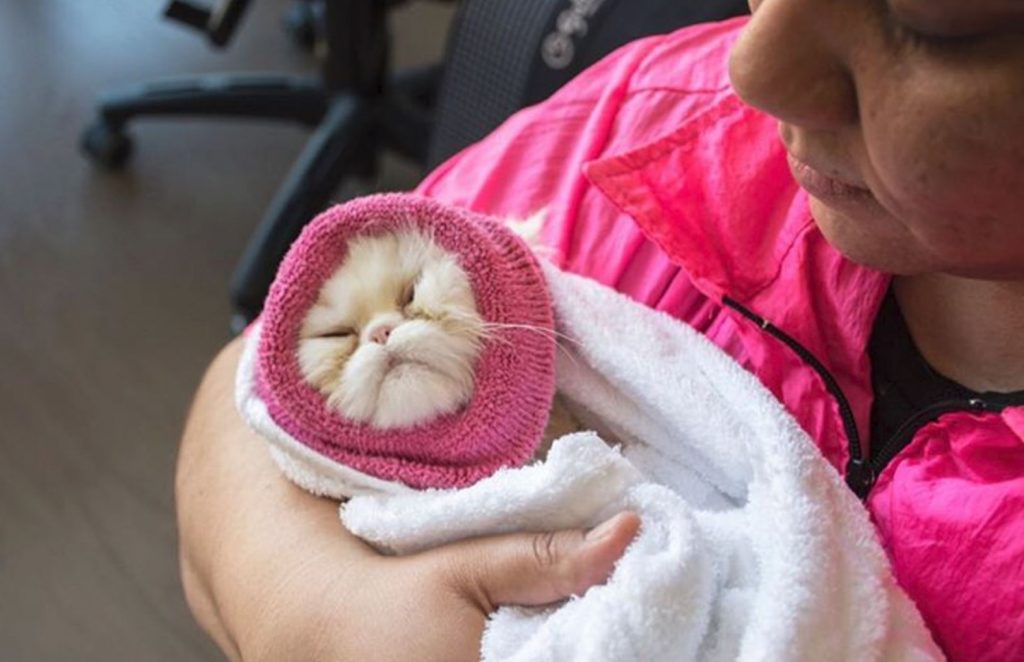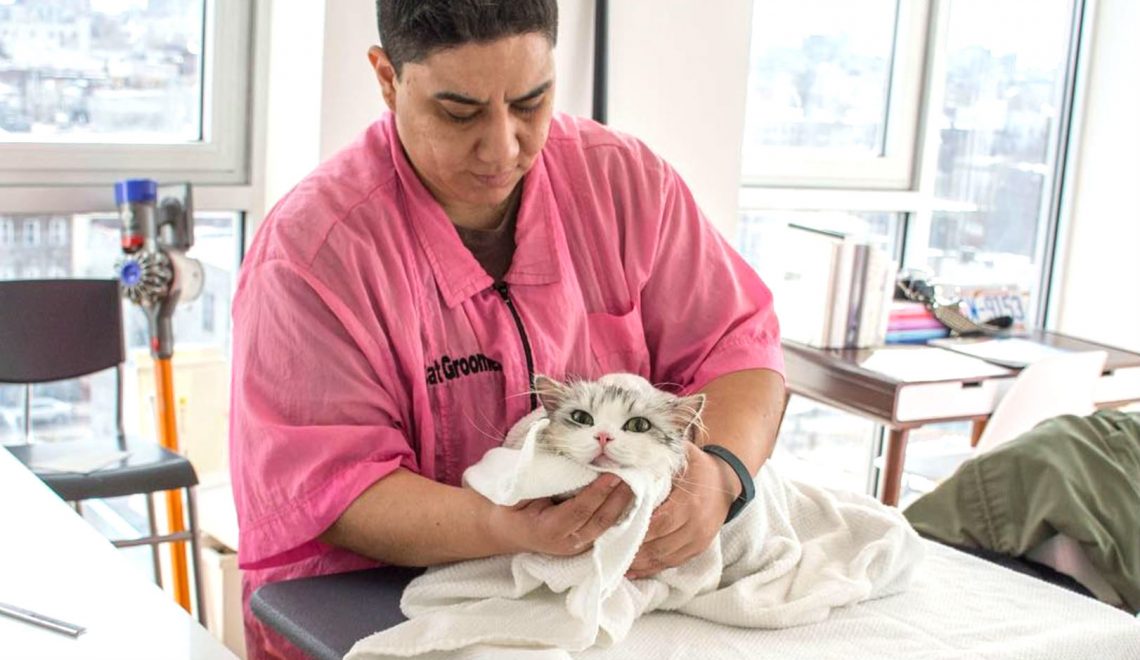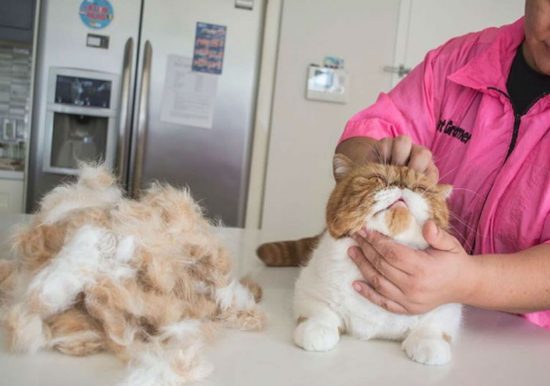No doubt about it: cats are great at self-grooming. Among their many unique evolutionary characteristics, today’s domesticated cats have comb-like tongues to help them brush through their fluffy coats! While many cats can get by without frequent baths or brushings, some longhaired breeds require assistance from their humans to feel fresh and comfortable in their fur. That’s where a cat groomer can step in to help!
We were curious to learn more about the unique career of a cat groomer and Carolyn Ayala, co-owner of Kitty Pride Cat Grooming, was kind enough to break everything down for us. From the positive impact grooming can make to a cat’s well-being to tips for grooming without a professional’s help, we learned a whole lot from what Ayala had to say! We hope you enjoy Ayala’s insights as much as we did.
1) What inspired you to become a cat groomer?
I was inspired to become a cat groomer when I worked in a doggy daycare as a dog groomer. People would walk into the shop and ask me if I could help them by grooming their cat. They needed basic things, like trimming their cat’s nails or solutions for controlling the shedding. Others had matted cats that needed urgent relief. At that time, I realized that I could not help these people because I did not understand how to handle and groom cats in the same way that I understood dogs. I made the decision to save my money and travel to South Carolina to become a student at
The National Cat Groomers Institute of America. I became New York State’s 3rd Certified Feline Master Groomer and New York City’s first (and currently, only).
Once I obtained my certification, I pretty much gave up dog grooming and don’t regret my decision. There are plenty of amazing dog groomers in NYC, but nowhere near enough well-trained cat groomers. My life and business partner, Erica, apprenticed with me for a year before she attended a rival cat grooming school herself. This decision was made because we wanted to offer our customers the best of both our training.
2) Do you have any cats yourself?
We have three cats. They are: Madonna (age 18) Domestic Short Hair Dilute Calico, Samo (age 5) Bi-Color Exotic Long Hair, and Sanjay (age 5) Red Persian Tabby.
 Meet Ayala’s cat, Sanjay… What a face he’s sporting!
Meet Ayala’s cat, Sanjay… What a face he’s sporting!
3) How often do you recommend humans groom their cats?
Having your long haired cat professionally groomed every 4-6 weeks is ideal. It takes about that long for most of them to become greasy again after their last bath. Mats will start to develop in areas of friction like the armpits and inner thighs. Owners who cannot have their cats groomed with such frequency should brush them daily to prevent matting. A small tangle left ignored can become a challenge.
Short hair cats will typically not mat up in the same manner that a long hair cat will. However, if you want those with cat allergies to comfortably visit, then consider (among other things) having your short haired cat bathed. Cats step in and out of their litter boxes several times a day and lick themselves quite a bit. Their dead skin cells, saliva, and urine contain dander. Dander (Fel d1) is invisible and responsible for cat allergy symptoms experienced by humans. Thus, a bathed cat has less dander and their shedding is better controlled, making your household less hampered with allergens.
4) What cat breeds typically need the most grooming or help from a cat groomer?
White Persian cats are the first to come to my mind. Obese cats of any breed are the second type to come to mind. They tend to get fecal matter stuck to their back ends because they can’t reach around and clean themselves. Senior cats need a lot of care, too. They mustn’t be allowed to get matted, because it’s so risky to shave them out. It’s also not uncommon for their nails to grow into their paw pads.

5) How do you calm cats during the grooming process?
Since cats are naturally very reactive, we ask that our customers keep their homes relatively quiet during our house-call cat grooming visits. This helps keep them calm. We also ask for permission to spray a little bit of feline pheromones in the air before the groom and we play soft kitty music during the process. Additionally, when the cat sees that their owner is calm, they usually stay calmer as well. Owners are always informed of our process and are welcome to watch us work. Many lovingly encourage their cats throughout the process.
6) Any pro-tips for humans seeking to groom their cats without the help of a professional cat groomer?
We love the Zoom Groom made by KONG and similar brushes. They are great for short haired cats. You can safely stir up a ton of undercoat with this tool and then use a tight comb to clear it out.
7) Any fun stories you’d like to share?
I wish I had some funny stories for you, but I really don’t. We have a lot of great experiences and memories. We have groomed some of NYC’s most intensely matted cats and when it’s all done, the feeling is amazing. It is emotionally rewarding to help cats not be in matted pain. As a cat groomer, I feel good when they feel good. Even a simple cat bath is great because it can strengthen the bond between the cat and it’s owner.
8) Do you have any cat customers who enjoy being groomed?
We have many cats who love certain parts of the groom. One of the cats we groom, Kirk, loves to have his belly shaved. He just lays on his back and looks so relaxed. It’s wonderful! I meet many cats that really enjoy the bath and even some who love, love, love to have their hair gloriously blown out.
9) How long does it take to groom kitties?
A groom can take anywhere from 30 minutes to 2 hours. It all depends on the cat’s age, the condition of their skin or coat, and the type of service they are receiving.
10) Are there any cat products you recommend that humans might not be aware of?
Until de-clawing becomes illegal everywhere, I would like more people to know about vinyl nail caps for cats, such as Soft Paws® / Soft Claws ®.










![Dj Scratch mixing some beats. 🎧 🎶 #Mewsic #KitNipBox
[via Instagram | @dharmacatnitiative]](https://www.kitnipbox.com/meow/wp-content/plugins/instagram-feed/img/placeholder.png)